外研版(2019)必修 第一册Unit 2 Exploring English Understanding ideas 课件(共29张PPT)
文档属性
| 名称 | 外研版(2019)必修 第一册Unit 2 Exploring English Understanding ideas 课件(共29张PPT) | 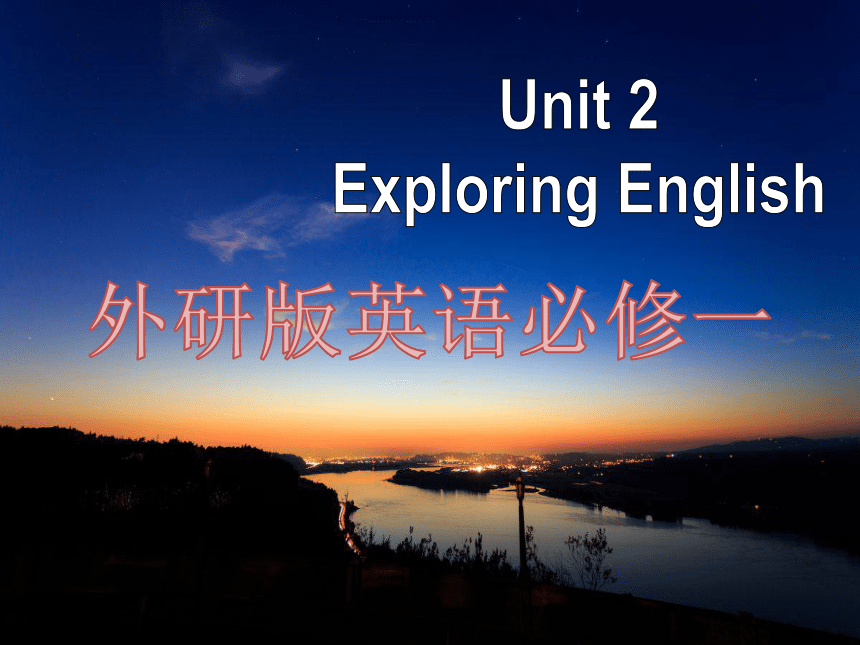 | |
| 格式 | pptx | ||
| 文件大小 | 835.8KB | ||
| 资源类型 | 教案 | ||
| 版本资源 | 外研版(2019) | ||
| 科目 | 英语 | ||
| 更新时间 | 2024-07-04 16:32:43 | ||
图片预览

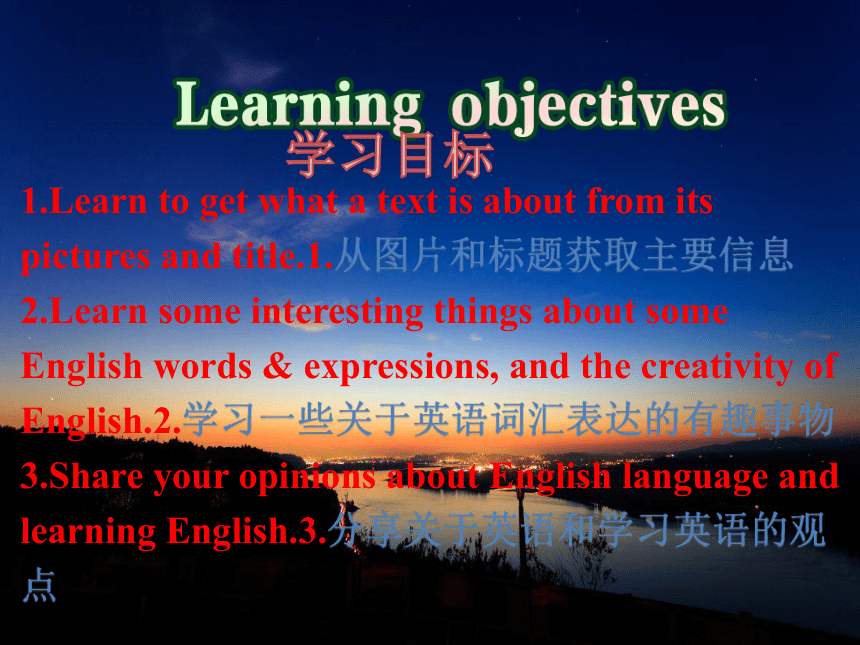
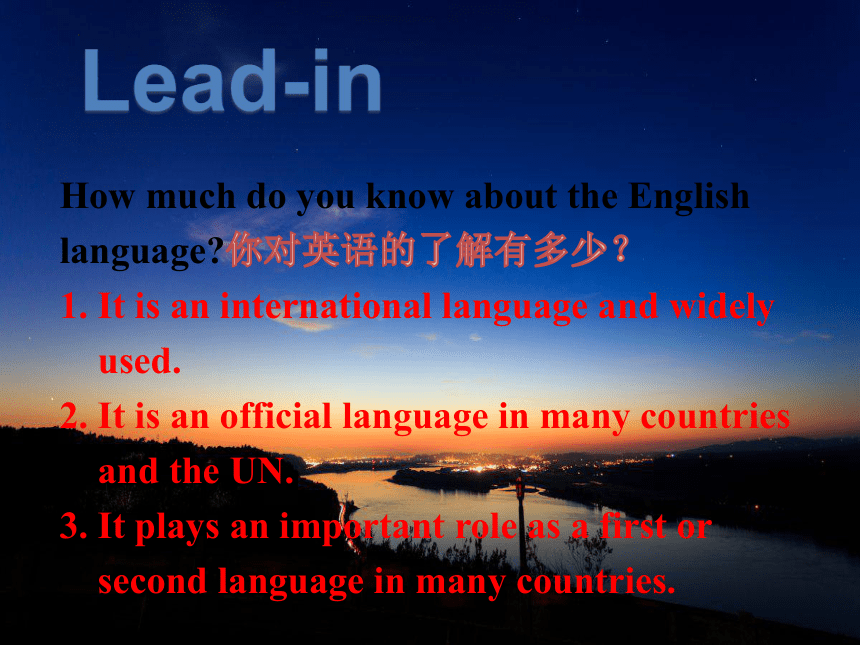
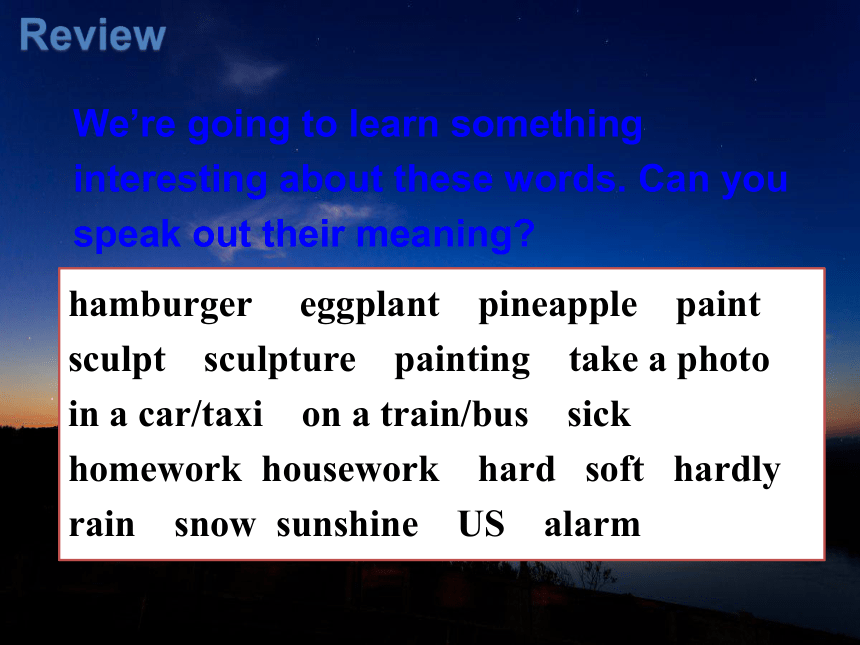


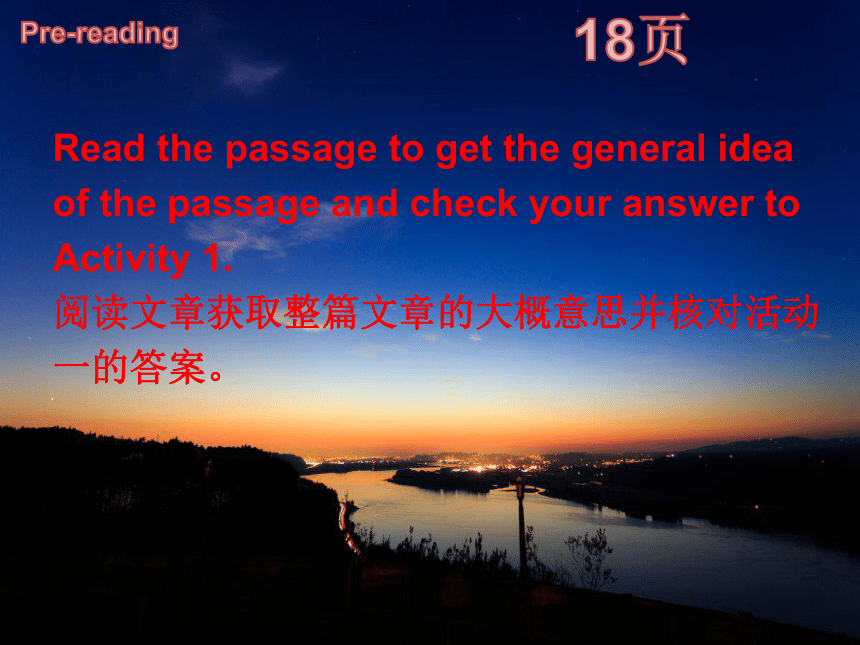

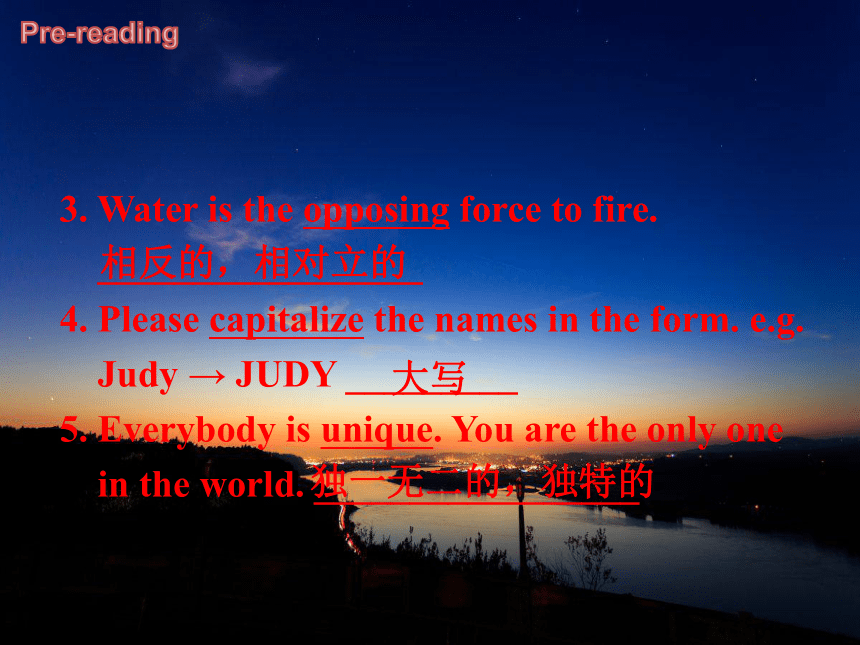
文档简介
(共29张PPT)
Unit 2
Exploring English
外研版英语必修一
1.Learn to get what a text is about from its pictures and title.1.从图片和标题获取主要信息
2.Learn some interesting things about some English words & expressions, and the creativity of English.2.学习一些关于英语词汇表达的有趣事物
3.Share your opinions about English language and learning English.3.分享关于英语和学习英语的观点
学习目标
How much do you know about the English language 你对英语的了解有多少?
1. It is an international language and widely
used.
2. It is an official language in many countries
and the UN.
3. It plays an important role as a first or
second language in many countries.
Lead-in
We’re going to learn something interesting about these words. Can you speak out their meaning
hamburger eggplant pineapple paint
sculpt sculpture painting take a photo
in a car/taxi on a train/bus sick homework housework hard soft hardly rain snow sunshine US alarm
Review
Look at the title of the passage and the pictures. Tick what you think the passage is about. Give your reasons.
food
cooking
words
plants
fruit
Neither Pine nor
Apple in Pineapple
Pre-reading
18页
Work in groups. Look at the pictures and guess what’s the meaning of the pictures.小组合作,看图片并猜测图片的意思。
Pre-reading
18页
Read the passage to get the general idea of the passage and check your answer to Activity 1.
阅读文章获取整篇文章的大概意思并核对活动一的答案。
18页
Pre-reading
Read the following sentences. Use the context to determine the Chinese meaning of the word underlined.猜测词义。
1. Little Tom felt sick because he traveled by
car. Poor boy, he got carsick. _________
2. If you are homesick, you feel unhappy
because you are away from home and are
missing your family, friends, and home very
much. _________
晕车的
想家的
Pre-reading
3. Water is the opposing force to fire.
_________________
4. Please capitalize the names in the form. e.g.
Judy → JUDY _________
5. Everybody is unique. You are the only one
in the world. _________________
相反的,相对立的
大写
独一无二的,独特的
Pre-reading
Neither Pine nor Apple in Pineapple
菠萝≠松树+苹果
Have you ever asked yourself why people often have trouble learning English? I hadn't ,until one day my five-year-old son asked me whether there was ham in hamburger . There isn't. This made me realize that there's no egg in eggplant either. Neither is there pine nor apple in pineapple . This got me thinking how English can be a crazy language to learn.
你有没有问过自己,为什么人们常常觉得学习英语很困难
我以前从未想过这个问题,直到有一天,我五岁的儿子问我汉堡包里面有没有火腿。
答案是没有。
这让我很意识到,茄子里面也没有鸡蛋
这让我陷入思考:对于学习者而言,英语到底该有多疯狂呢?
而菠萝里面既没有松树,也没有苹果。
Pre-reading
Neither Pine nor Apple in Pineapple
菠萝≠松树+苹果
For example, in our free time we can sculpt a sculpture and paint a painting, but we take a photo. And when we are traveling we say that we are in the car or the taxi, but on the train or bus! While we're doing all these traveling, we can get seasick at sea, airsick in the air and carsick in a car, but we don't get homesick when we get back home. And speaking of home,why aren’t homework and homework the same thing.
例如,闲暇时我们可以调可以做雕像、画一幅画,但只能拍一张照片。
旅行时,我们做汽车或出租车时是说坐在里面,坐火车或公共汽车时却要说坐在上面!
同样,我们会在海上晕船,在飞机里晕机,在车里晕车,但回到家里,我们却不会晕家,实际上意为思乡的。
说到家,为什么家庭作业和家务,这两个单词看起来很像,意思却不是一回事儿呢?
Pre-reading
Neither Pine nor Apple in Pineapple
菠萝≠松树+苹果
If “hard” is the opposite of “soft”, why are “hardly” and “softly” not an opposing pair If harmless actions are the opposite of harmful actions, why are shameless and shameful behaviors the same
如果说硬是软的反义词, 为什么 几乎不 和 柔和的 却不是一对反义词?如果说无害行为和有害行为意思相反,为什么无耻行为和可耻行为反而是一回事儿?
Pre-reading
Neither Pine nor Apple in Pineapple
菠萝≠松树+苹果
When we look out of the window and see rain or snow, we can say “it's raining” or “it's snowing”. But when we see sunshine, we can't say “it's sunshining”.
当我们望向窗外,看到雨或雪时,我们可以说正在下雨或正在下雪。可我们看见阳光的时候,却不能说正在下阳光。
Pre-reading
Neither Pine nor Apple in Pineapple
菠萝≠松树+苹果
Even the smallest words can be confusing. When you see the capitalized “W H O” in a medical report do you read it as the “who” in “Who’s that ” What about IT and US.
就算是最短小的单词都让人费解,如果你在医学报告中看到大写的WHO,你会把它读成Who’s that中的who吗?那么IT 和US又该怎么读呢?
Pre-reading
Neither Pine nor Apple in Pineapple
菠萝≠松树+苹果
You also have to wander at the unique madness of a language in which a house can burn up as it burns down, in which you fill in a form by filling it out and in which an alarm is only heard once it goes off!
英语这门语言独有的疯狂令你不得不感到惊奇,在英语里房子烧成灰烬的时候,可以说烧上去,也可以说边烧下去,填表的时候,你可以说填入表里,也可以说填到表外,而且只有闹钟走了(离开了)以后你才能听到铃声。
Pre-reading
Neither Pine nor Apple in Pineapple
菠萝≠松树+苹果
English was invented by people, not computers, and it reflects the creativity of the human race. That is why when the stars are out, they are visible, but when the lights are out, they are invisible. And that is why when I wind up my watch, it starts, but when I wind up this passage, it ends.
英语是人创造的,不是计算机发明的,它反映了人类的创造力。这就是为什么星星出来的时候我们能看到星星,而灯灭了的时候,我们却看不到灯光。这也是当我给手表上紧发条以后,表针开始走,而我将本文收尾后这篇文章结束的原因。
Pre-reading
Read the passage again and then find out the sentences that can show author’s opinions about English.
1.This got me thinking how English can be a crazy language to learn.
3.English was invented by people, not computers, and it reflects the creativity of the human race.
2.You also have to wonder at the unique madness of a language in which…
Pre-reading
Choose the author’s purpose in writing the passage.
To tell us that English is difficult to learn.
To give advice on how to learn English.
To show that English is interesting and creative.
To explain how English was created.
√
While-reading
20页
Housework and homework mean the same.
The opposite of “hardly” is not softly.
WHO in a medical report is used to ask a person.
“Fill in” has the same meaning as “fill out”.
If an alarm goes off, it makes a sudden noise.
Once I wind up my article, I am ready to write a passage.
Decide whether the statements are True (T) or False (F) according to the text.
F
T
F
F
T
T
While-reading
In order to support his idea, the author uses many examples that show the 1. ________ madness of English. no egg in eggplant no ham in 2. ________ neither pine nor apple in 3. _______ sculpt a sculpture
paint a(n) 4. ________
BUT take a photo
seasick sick at sea 5. ________ sick in the air 6. ________ sick in a car BUT 7. ________ sick at home “Hard” is the opposite of “soft”.
“Hardly” and “softly” are not a(n) 8. _________ pair.
unique
hamburger
pineapple
painting
airsick
carsick
homesick
opposing
Complete the notes with words from the passage.
While-reading
21页
“Harmless” is the opposite of “harmful”. Shameful and shameless 9. _________ are the same. burn up burn down
fill in a form 10. _______ a form
Stars are out. They are visible. Lights are out. They are 11. ________. I wind up my watch. It starts.
I wind up the passage.
It 12. ______.
The reason is that English was invented by people, and it 13. _______ the creativity of the human race. behaviors
fill out
invisible
ends
reflects
Pay attention to the methods and sentence patterns that introduce examples in the passage.
While-reading
21页
English is a crazy language. no ... in ... ★ no ham in 1. ________
★ no egg in 2. ________
★ no pine in pineapple
★ no apple in pineapple
Read the passage again and complete the following form.
hamburger
eggplant
While-reading
English is a crazy language. same structure, different words ★sculpt a(n) 3. __________ and
paint a painting, but 4.
________ a photo
★in the car or the taxi, but 5.
________ the train or bus
sculpture
take
on
While-reading
English is a crazy language. same form, different meaning (pronunciation) ★seasick, airsick, carsick ≠ 6.
________
★hard soft ≠ hardly 7.
________
★harmless harmful, but
shameless = 8. ___________
★ WHO ≠ who
★ IT ≠ it
★ US ≠ us
homesick
softly
shameful
While-reading
English is a crazy language. opposite words, same meaning ★ burn up = burn 9.
________
★fill in = fill out
same words, opposite meaning ★The stars are out (visible).
★The lights are out (10.
________).
★Wind up the watch. (It
starts.)
★Wind up this 11. ________.
(It ends.)
down
invisible
passage
While-reading
How did pineapples, hamburgers and eggplants get their names 菠萝,汉堡和茄子是怎么获取自己的名字?
The name of “pineapple” developed from the Spanish word “pina”, with “apple” added to show it’s a kind of fruit; the name of hamburger came from the idea of “Hamburg steak”, and later people reinvented it and called it “hamburger”; eggplants got the name because they used to look like eggs.
Read the information on the book and answer the questions.
Post-reading
2. Does the information give you a better understanding of the passage Give your reasons.这些信息能不能让你更好地理解文章?
Open.开放性答案
Post-reading
Do you agree with the author’s opinion about the English language Give your reasons.你是否同意作者关于作者的观点?
What do you find most challenging about learning English How do you deal with this 你发现学习英语最有挑战的是什么?
Post-reading
思考
1. Search interesting stories that happen because of misunderstanding of English words or expressions. Share your stories in your group.
2. Does Chinese have the similar situations mentioned in the text Give your examples.
Post-reading
课后作业
Unit 2
Exploring English
外研版英语必修一
1.Learn to get what a text is about from its pictures and title.1.从图片和标题获取主要信息
2.Learn some interesting things about some English words & expressions, and the creativity of English.2.学习一些关于英语词汇表达的有趣事物
3.Share your opinions about English language and learning English.3.分享关于英语和学习英语的观点
学习目标
How much do you know about the English language 你对英语的了解有多少?
1. It is an international language and widely
used.
2. It is an official language in many countries
and the UN.
3. It plays an important role as a first or
second language in many countries.
Lead-in
We’re going to learn something interesting about these words. Can you speak out their meaning
hamburger eggplant pineapple paint
sculpt sculpture painting take a photo
in a car/taxi on a train/bus sick homework housework hard soft hardly rain snow sunshine US alarm
Review
Look at the title of the passage and the pictures. Tick what you think the passage is about. Give your reasons.
food
cooking
words
plants
fruit
Neither Pine nor
Apple in Pineapple
Pre-reading
18页
Work in groups. Look at the pictures and guess what’s the meaning of the pictures.小组合作,看图片并猜测图片的意思。
Pre-reading
18页
Read the passage to get the general idea of the passage and check your answer to Activity 1.
阅读文章获取整篇文章的大概意思并核对活动一的答案。
18页
Pre-reading
Read the following sentences. Use the context to determine the Chinese meaning of the word underlined.猜测词义。
1. Little Tom felt sick because he traveled by
car. Poor boy, he got carsick. _________
2. If you are homesick, you feel unhappy
because you are away from home and are
missing your family, friends, and home very
much. _________
晕车的
想家的
Pre-reading
3. Water is the opposing force to fire.
_________________
4. Please capitalize the names in the form. e.g.
Judy → JUDY _________
5. Everybody is unique. You are the only one
in the world. _________________
相反的,相对立的
大写
独一无二的,独特的
Pre-reading
Neither Pine nor Apple in Pineapple
菠萝≠松树+苹果
Have you ever asked yourself why people often have trouble learning English? I hadn't ,until one day my five-year-old son asked me whether there was ham in hamburger . There isn't. This made me realize that there's no egg in eggplant either. Neither is there pine nor apple in pineapple . This got me thinking how English can be a crazy language to learn.
你有没有问过自己,为什么人们常常觉得学习英语很困难
我以前从未想过这个问题,直到有一天,我五岁的儿子问我汉堡包里面有没有火腿。
答案是没有。
这让我很意识到,茄子里面也没有鸡蛋
这让我陷入思考:对于学习者而言,英语到底该有多疯狂呢?
而菠萝里面既没有松树,也没有苹果。
Pre-reading
Neither Pine nor Apple in Pineapple
菠萝≠松树+苹果
For example, in our free time we can sculpt a sculpture and paint a painting, but we take a photo. And when we are traveling we say that we are in the car or the taxi, but on the train or bus! While we're doing all these traveling, we can get seasick at sea, airsick in the air and carsick in a car, but we don't get homesick when we get back home. And speaking of home,why aren’t homework and homework the same thing.
例如,闲暇时我们可以调可以做雕像、画一幅画,但只能拍一张照片。
旅行时,我们做汽车或出租车时是说坐在里面,坐火车或公共汽车时却要说坐在上面!
同样,我们会在海上晕船,在飞机里晕机,在车里晕车,但回到家里,我们却不会晕家,实际上意为思乡的。
说到家,为什么家庭作业和家务,这两个单词看起来很像,意思却不是一回事儿呢?
Pre-reading
Neither Pine nor Apple in Pineapple
菠萝≠松树+苹果
If “hard” is the opposite of “soft”, why are “hardly” and “softly” not an opposing pair If harmless actions are the opposite of harmful actions, why are shameless and shameful behaviors the same
如果说硬是软的反义词, 为什么 几乎不 和 柔和的 却不是一对反义词?如果说无害行为和有害行为意思相反,为什么无耻行为和可耻行为反而是一回事儿?
Pre-reading
Neither Pine nor Apple in Pineapple
菠萝≠松树+苹果
When we look out of the window and see rain or snow, we can say “it's raining” or “it's snowing”. But when we see sunshine, we can't say “it's sunshining”.
当我们望向窗外,看到雨或雪时,我们可以说正在下雨或正在下雪。可我们看见阳光的时候,却不能说正在下阳光。
Pre-reading
Neither Pine nor Apple in Pineapple
菠萝≠松树+苹果
Even the smallest words can be confusing. When you see the capitalized “W H O” in a medical report do you read it as the “who” in “Who’s that ” What about IT and US.
就算是最短小的单词都让人费解,如果你在医学报告中看到大写的WHO,你会把它读成Who’s that中的who吗?那么IT 和US又该怎么读呢?
Pre-reading
Neither Pine nor Apple in Pineapple
菠萝≠松树+苹果
You also have to wander at the unique madness of a language in which a house can burn up as it burns down, in which you fill in a form by filling it out and in which an alarm is only heard once it goes off!
英语这门语言独有的疯狂令你不得不感到惊奇,在英语里房子烧成灰烬的时候,可以说烧上去,也可以说边烧下去,填表的时候,你可以说填入表里,也可以说填到表外,而且只有闹钟走了(离开了)以后你才能听到铃声。
Pre-reading
Neither Pine nor Apple in Pineapple
菠萝≠松树+苹果
English was invented by people, not computers, and it reflects the creativity of the human race. That is why when the stars are out, they are visible, but when the lights are out, they are invisible. And that is why when I wind up my watch, it starts, but when I wind up this passage, it ends.
英语是人创造的,不是计算机发明的,它反映了人类的创造力。这就是为什么星星出来的时候我们能看到星星,而灯灭了的时候,我们却看不到灯光。这也是当我给手表上紧发条以后,表针开始走,而我将本文收尾后这篇文章结束的原因。
Pre-reading
Read the passage again and then find out the sentences that can show author’s opinions about English.
1.This got me thinking how English can be a crazy language to learn.
3.English was invented by people, not computers, and it reflects the creativity of the human race.
2.You also have to wonder at the unique madness of a language in which…
Pre-reading
Choose the author’s purpose in writing the passage.
To tell us that English is difficult to learn.
To give advice on how to learn English.
To show that English is interesting and creative.
To explain how English was created.
√
While-reading
20页
Housework and homework mean the same.
The opposite of “hardly” is not softly.
WHO in a medical report is used to ask a person.
“Fill in” has the same meaning as “fill out”.
If an alarm goes off, it makes a sudden noise.
Once I wind up my article, I am ready to write a passage.
Decide whether the statements are True (T) or False (F) according to the text.
F
T
F
F
T
T
While-reading
In order to support his idea, the author uses many examples that show the 1. ________ madness of English. no egg in eggplant no ham in 2. ________ neither pine nor apple in 3. _______ sculpt a sculpture
paint a(n) 4. ________
BUT take a photo
seasick sick at sea 5. ________ sick in the air 6. ________ sick in a car BUT 7. ________ sick at home “Hard” is the opposite of “soft”.
“Hardly” and “softly” are not a(n) 8. _________ pair.
unique
hamburger
pineapple
painting
airsick
carsick
homesick
opposing
Complete the notes with words from the passage.
While-reading
21页
“Harmless” is the opposite of “harmful”. Shameful and shameless 9. _________ are the same. burn up burn down
fill in a form 10. _______ a form
Stars are out. They are visible. Lights are out. They are 11. ________. I wind up my watch. It starts.
I wind up the passage.
It 12. ______.
The reason is that English was invented by people, and it 13. _______ the creativity of the human race. behaviors
fill out
invisible
ends
reflects
Pay attention to the methods and sentence patterns that introduce examples in the passage.
While-reading
21页
English is a crazy language. no ... in ... ★ no ham in 1. ________
★ no egg in 2. ________
★ no pine in pineapple
★ no apple in pineapple
Read the passage again and complete the following form.
hamburger
eggplant
While-reading
English is a crazy language. same structure, different words ★sculpt a(n) 3. __________ and
paint a painting, but 4.
________ a photo
★in the car or the taxi, but 5.
________ the train or bus
sculpture
take
on
While-reading
English is a crazy language. same form, different meaning (pronunciation) ★seasick, airsick, carsick ≠ 6.
________
★hard soft ≠ hardly 7.
________
★harmless harmful, but
shameless = 8. ___________
★ WHO ≠ who
★ IT ≠ it
★ US ≠ us
homesick
softly
shameful
While-reading
English is a crazy language. opposite words, same meaning ★ burn up = burn 9.
________
★fill in = fill out
same words, opposite meaning ★The stars are out (visible).
★The lights are out (10.
________).
★Wind up the watch. (It
starts.)
★Wind up this 11. ________.
(It ends.)
down
invisible
passage
While-reading
How did pineapples, hamburgers and eggplants get their names 菠萝,汉堡和茄子是怎么获取自己的名字?
The name of “pineapple” developed from the Spanish word “pina”, with “apple” added to show it’s a kind of fruit; the name of hamburger came from the idea of “Hamburg steak”, and later people reinvented it and called it “hamburger”; eggplants got the name because they used to look like eggs.
Read the information on the book and answer the questions.
Post-reading
2. Does the information give you a better understanding of the passage Give your reasons.这些信息能不能让你更好地理解文章?
Open.开放性答案
Post-reading
Do you agree with the author’s opinion about the English language Give your reasons.你是否同意作者关于作者的观点?
What do you find most challenging about learning English How do you deal with this 你发现学习英语最有挑战的是什么?
Post-reading
思考
1. Search interesting stories that happen because of misunderstanding of English words or expressions. Share your stories in your group.
2. Does Chinese have the similar situations mentioned in the text Give your examples.
Post-reading
课后作业
